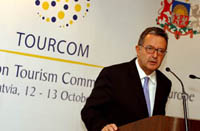‘Engage the media’ concludes Tourcom
 A regional conference in Riga, Latvia is encouraging the travel industry to be more pro-active with the media in terms of communications, relationships and giving out transparent information.This was the consensus at the European regional conference on tourism communications organized by the World Tourism Organisation (WTO), with delegates highlighting the significance of the media in swaying people’s travel decisions.
A regional conference in Riga, Latvia is encouraging the travel industry to be more pro-active with the media in terms of communications, relationships and giving out transparent information.This was the consensus at the European regional conference on tourism communications organized by the World Tourism Organisation (WTO), with delegates highlighting the significance of the media in swaying people’s travel decisions.
Tourism ministers and commercial travel bodies also called on the media to report more accurately and in sufficient depth and context, so that people can make more informed decisions when they travel.
“I am greatly encouraged to see that the global media are beginning to understand this responsibility and take it more seriously in their reporting,” said Francesco Frangiallli, secretary-general of the WTO.
“For example we can see a much more widespread use of maps in disaster coverage. This has the effect of limiting the scope of the problem.”
Frangialli also highlighted that the media is changing and that there is more positive news coverage coming out of Africa, the Middle East and India—areas that had previously little air time aside from disasters.
ADVERTISEMENT
Journalists at the conference focused on the need for the travel industry to provide short, transparent, fact-based, tailored information to the media.
They also reiterated that tourism representatives can achieve better coverage by making deeper personal contacts with journalists, and that journalists appreciate help in identifying interesting stories and people to portray, as well as events in sport, fashion and music.
“Communications by the tourism sector with the media and consumers will be based more on emotions, experiences, stories and dreams,” said Iris Brouwer, marketing director at THR Consulting.
The conference also looked at the need for more personalisation in communicating tourism and travel concepts to the media, knowing that people are not necessarily swayed by mass advertising and brand imagery.
“Destinations should also try to have web-information in many languages, not forgetting Spanish and Chinese, it is essential,” said Graham Cooke, president of the World Travel Awards..
As bird flu rages across Europe, the conference also looked at the need for crisis management and the need to communicate to the media quickly, honestly and precisely, as well as in a coordinated way when a crisis unfolds.
Speakers expressed the need to prepare for crisis and set up partnerships, tourism crisis plans and teams that make a clear division of responsibilities before disaster hits.
“Do not neglect information to the media and tourism professionals when a potential crisis emerges,” said Alexander Rayner, CEO of Destination Consultants.
With the rise of the advertorial in the tourism business, Richard Baerug, marketing director at the Riga Convention Bureau made a defence for good journalism and highlighted how advertorials are blurring the line for the travel business.
“We should encourage tourism companies and destinations to use media companies that make a clear distinction between advertising and journalism,” explained Baerug.
——-

